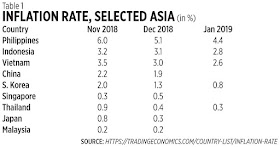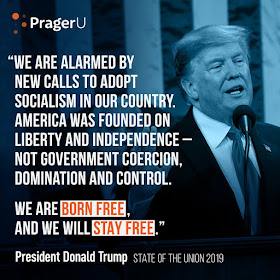* This is my column in BusinessWorld last February 19, 2019.
On the Philippines’ GDP growth rates, the good news is
that from 2010 to 2018, the Philippines has been growing above 6% yearly except
in 2011. High growth was experienced in 2010 with 7.6% (recovery from 2008-2009
global financial turmoil) and 2013 (election year) with 7.1%.
The bad news is that these growth rates are not enough.
The Philippines, with 106 million people, has a GDP size in 2017 of only $314
billion while neighbors with their smaller populations had similar or larger
GDP sizes: Malaysia (32M) has $312B, Singapore (5.8M) has $324B, Thailand (69M)
has $490B. We need to grow 7-10% per year for many years before we can even
catch up with Thailand or Malaysia (Source: IMF, World Economic Outlook [WEO]
October 2018).
Among the important factors to have high and sustained
growth is to have high and rising supply of cheaper and stable electricity.
There are numbers that show a correlation between GDP growth and electricity
consumption growth especially for developing countries like the Philippines
(see Figure 1).
Among the ASEAN 6, a similar pattern can be observed,
also with China and Japan. The Philippines’ low GDP size is reflected in its
low electricity consumption in tera-watt hours (TWH) (see figure 2).
There are many factors why our electricity supply and
consumption is low compared to our neighbors, like the thick, expansive
bureaucracies and permits required before one can explore and develop new power
plants.
We focus on the role and “mis-role” of electric
cooperatives (ECs). Since they are geographical monopolies granted with
congressional franchise to distribute electricity, they can help expand or
restrict power demand. If an EC for instance is mismanaged and does not pay the
power generation company (genco), even if the genco has big plans to expand
power capacity, it cannot do so.
The Department of Energy (DoE) has issued two media
releases related to problematic ECs dated February 01 and February 06. It noted
that many ECs are failures in expanding rural electrification because of
“inefficient management, corruption, unnecessary political interference,
institutional conflicts.”
So DoE will conduct a performance review of ECs,
especially those that burden their communities with persistent and unresolved
brownouts, because they have heavy debts and do not pay their power supply.
Underperforming ones will be assisted while non-performing ones will be
recommended for cancellation of their franchises.
DOE has identified 17 ECs that are chronic failures to
provide satisfactory services to their customers as stipulated in their
congressional franchise. Seven are from Regions IV-B and V — ALECO (Albay),
CASURECO III (Camarines Sur), FICELCO (Catanduanes), MASELCO (Masbate), OMECO
(Occidental Mindoro), ORMECO (Oriental Mindoro), and PALECO (Palawan). Other
problematic ECs are PELCO (Pampanga), BASELCO (Basilan), LASURECO (Lanao),
SULECO (Sulu), ZAMCELCO (Zamboanga), and DANECO (Davao del Norte).
Then certain islands have rising missionary subsidies —
which are then passed on to all electricity consumers nationwide via high
universal charges.
In three previous articles in this column, “Unstable
power supply due to problematic electric cooperatives” (February 08, 2017),
“How the bureaucracy works against cheap and stable electricity (March 08,
2017), and “Corporatization of electric cooperatives can reduce system loss”
(September 29, 2017), it is argued that ultimately all ECs should be
corporatized and depoliticized, be registered as corporations with SEC, and not
with NEA.
----------------
See also:
BWorld 292, Inflation and the Transportation sector, February 08, 2019
BWorld 293, Solar para sa pulitika, Rice Tariffication para sa masa, February 13, 2019
BWorld 294, The freedom to fly, February 23, 2019



























